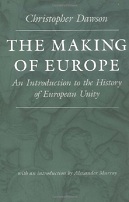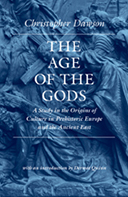This work, first published by Sheed & Ward in 1954, had its origin in an earlier work entitled Medieval Religion, which Dawson delivered as the Forwood Lectures at Liverpool University in 1934. In Medieval Essays he added six more essays, two of which had been published elsewhere. It is a work that is full of original, thought-provoking ideas and a call for the study of Christian culture as a field deserving of equal attention as that of the classical culture of Greece and Rome.
Central Themes
In the introductory essay of this volume – The Study of Christian Culture – Dawson rejects the very concept of the word ‘medieval’, implying as it does an age of transition between two more significant ages, namely classical Greece and Rome and the modern world: “… the Middle Ages are not a kind of waiting room between two different worlds, but the age which made a new world… from which we come and to which in a sense we still belong.” This strongly held belief led to his work, particularly in America, to establish centres of education for the study of Christian culture, starting with his appointment to the Harvard Chair of Roman Catholic Studies in 1958.
A second important theme of this work is the influence of the East (particularly the Moslem world) on Christian culture. Examples of this can be found in the Middle Eastern origins of the cult of courtly love, such as may be seen in the story of Tristan and Isolde, with its notably un-Christian praises of beauty, passion, melancholy and fatalism.
Another area in which this influence is manifestly apparent is that of science. In his essay on The Scientific Development of Medieval Culture Dawson acknowledges that the great decline in scientific knowledge in the Dark Ages can be largely ascribed to the advent of Christianity and its turning away from the material world. The Moslem East, on the other hand, embraced the science of the ancient Greeks, and from there it began to filter back into Western consciousness. It was in the thirteenth century that science began to make a real comeback in the Christian West, with figures such as Albertus Magnus, Thomas Aquinas and the extraordinary Roger Bacon, who predicted “automobiles, flying machines and devices that will destroy a whole army at once.” And, Dawson adds, highlighting the importance of studying and learning from history, we cannot now “… afford altogether to despise his warnings of the dangers of allowing these vast forces to escape moral direction and social control.”
Evaluation of the Work
This work shows not only Christopher Dawson’s originality and penetrating insights into the significance and importance of Medieval culture, but also his open-mindedness towards the value of other cultures, the shortcomings of Christian culture and the way in which it absorbed and then transformed these outside influences, contributing to the birth of the modern world. As always, his wide-ranging knowledge, accumulated over decades of study, introduces us to a procession of interesting characters in the political, literary and scientific worlds of the time.
PRAISE FOR THE ORIGINAL EDITION:
“Those familiar with Dawson’s numerous volumes know he is lucid, provocative, informative, charming. They recognize in him a historian of culture who can write most interestingly and convincingly on the highest level of historical generalizations or narrative propositions […] Thus it does not require a specialized medievalist to profit from the riches of Dawson’s cultural studies.” – Ernst B. Koenker, The Journal of Religion 1955.


